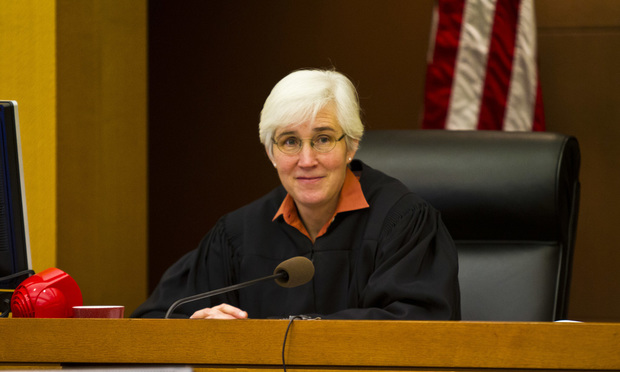Opening Statements in J&J Baby Powder Case Predict a Looming Battle of Experts
Johnson & Johnson is accused of failing to warn a woman who died of ovarian cancer in 2016 of the dangers of using the product despite having known for years that it was hazardous.
September 12, 2019 at 04:01 PM
5 minute read
 Judge Jane Morrison, Fulton County State Court. (Photo: John Disney/ALM)
Judge Jane Morrison, Fulton County State Court. (Photo: John Disney/ALM)
Jurors heard opening statements Thursday in a Fulton County case accusing Johnson & Johnson of marketing talc-based baby powder that caused a woman to die from ovarian cancer decades after she began using the product as a teen.
The trial, expected to run for two weeks, opened one day after a New Jersey jury slammed the company with a $37.3 million verdict over claims its talcum powder caused four people to develop mesothelioma. Johnson & Johnson asked for a mistrial in that case after the judge struck its closing arguments.
The Georgia case before Fulton County Judge Jane Morrison centers on the 2016 death of Diane Brower who, according to court documents, used the company's baby powder in 1963. She was diagnosed with Stage 3 ovarian cancer a few years before her death.
According to the lawsuit filed by Brower's executor and adopted granddaughter in Fulton County State Court, Johnson & Johnson knew for decades that there was a risk of ovarian cancer for women who applied its powder on or near their genitals but deliberately failed to warn them.
 Allen Smith of The Smith Law Firm in Ridgeland, Mississippi. (Courtesy photo)
Allen Smith of The Smith Law Firm in Ridgeland, Mississippi. (Courtesy photo)On Thursday, lead plaintiffs attorney R. Allen Smith of The Smith Law Firm in Ridgeland, Mississippi, told jurors the company knew as far back as the 1930s that the use of talc posed a health threat but opted to keep using it, even though it also marketed a cornstarch-based powder that breaks down in the body and poses no risk.
"That's what makes this conduct so reprehensible," said Smith, noting that studies dating to the 1970s suggest a link between the use of talc and ovarian cancer.
Unlike medical products, which require preapproval from the U.S. Food and Drug Administration, baby powder is a cosmetic that requires no review, he said.
"There's no standard," said Smith, which makes it even more vital that companies warn their customers of known risks.
"Then there's a separate issue: Did Johnson & Johnson baby powder cause Ms. Brower's ovarian cancer?" Smith said.
"We're going to show that it was a contributing cause," he said.
Smith noted that Brower had tubal ligation in 1980, so there was no way talc could have migrated into her ovaries after that. Even so, an examination of her ovarian tissue after her death showed the presence of talc.
"I'm not going to cherry-pick old evidence. I don't rely on what we knew five years ago. We're going to rely on state-of-the-art science," said Smith, whose team includes Ted Meadows of Beasley, Allen, Crow, Methvin Portis & Miles in Montgomery, and Sharon Zinns and Robert Register in the firm's Atlanta office.
 James T. Smith, partner, b usiness litigation, Blank Rome, Philadelphia. (Courtesy photo)
James T. Smith, partner, b usiness litigation, Blank Rome, Philadelphia. (Courtesy photo)Rising for Johnson & Johnson, lead defense attorney James Smith of Blank Rome in Philadelphia urged jurors to keep an open mind, saying the plaintiff's version of the case "just isn't true because the science doesn't support it."
Multiple peer-reviewed studies have shown the application of talc does not cause ovarian cancer, Smith said.
"And any suggestion by plaintiffs counsel that there is some sort of conspiracy, cover-up, hiding document is not true," he said.
Warning jurors that there would be in-depth discussions of subjects that might make them uncomfortable, Smith said the issue of whether and how talc can migrate into a woman's ovaries is a "very contested point" of the case, and laid out the experts and studies he believes will support their thesis that no such evidence exists.
While there have been studies that show an association between the use of baby powder and ovarian cancer, Smith said they did not provide any evidence of linkage.
"Association doesn't mean cause," said Smith, using the analogy of bald men wearing hats.
"There's an association between bald men and hats, but we know hats don't cause baldness," he said.
The suggestion that talc is unsafe is groundless, he said, noting that the mineral is present in commonly consumed items such as Advil, Pepto-Bismol and chewing gum.
The case will be one of "competing experts," Smith said.
"None of the experts the plaintiffs will offer have ever published an article in a peer-reviewed journal that the perineal application of talc causes ovarian cancer," said Smith, whose team includes Debra Pole and Eric Schwartz of Sidley Austin in Los Angeles, Z. Ileana Martinez and Leslie Suson of Thompson Hine in Atlanta and Mark Hegarty of Shook, Hardy & Bacon in Kansas City, Missouri.
The verdict "can't be based on sympathy," he said, or upon "fear, anger, emotion. It has to be based on science."
The Brower litigation is one of more than an estimated 14,600 cases filed around the country claiming that Johnson & Johnson continued marketing its talc-containing products without warning women they could lead to an increased risk for ovarian cancer.
This content has been archived. It is available through our partners, LexisNexis® and Bloomberg Law.
To view this content, please continue to their sites.
Not a Lexis Subscriber?
Subscribe Now
Not a Bloomberg Law Subscriber?
Subscribe Now
NOT FOR REPRINT
© 2025 ALM Global, LLC, All Rights Reserved. Request academic re-use from www.copyright.com. All other uses, submit a request to [email protected]. For more information visit Asset & Logo Licensing.
You Might Like
View All
Evidence Explained: Prevailing Attorney Outlines Successful Defense in Inmate Death Case


Upcoming Changes to Medicare Secondary Payer Reporting: What WC Insurers and Attorneys Need to Know
5 minute read
Biden Administration Tells Justices That Bans on Gender Care Are Sex Discrimination
Trending Stories
- 1Uber Files RICO Suit Against Plaintiff-Side Firms Alleging Fraudulent Injury Claims
- 2The Law Firm Disrupted: Scrutinizing the Elephant More Than the Mouse
- 3Inherent Diminished Value Damages Unavailable to 3rd-Party Claimants, Court Says
- 4Pa. Defense Firm Sued by Client Over Ex-Eagles Player's $43.5M Med Mal Win
- 5Losses Mount at Morris Manning, but Departing Ex-Chair Stays Bullish About His Old Firm's Future
Who Got The Work
J. Brugh Lower of Gibbons has entered an appearance for industrial equipment supplier Devco Corporation in a pending trademark infringement lawsuit. The suit, accusing the defendant of selling knock-off Graco products, was filed Dec. 18 in New Jersey District Court by Rivkin Radler on behalf of Graco Inc. and Graco Minnesota. The case, assigned to U.S. District Judge Zahid N. Quraishi, is 3:24-cv-11294, Graco Inc. et al v. Devco Corporation.
Who Got The Work
Rebecca Maller-Stein and Kent A. Yalowitz of Arnold & Porter Kaye Scholer have entered their appearances for Hanaco Venture Capital and its executives, Lior Prosor and David Frankel, in a pending securities lawsuit. The action, filed on Dec. 24 in New York Southern District Court by Zell, Aron & Co. on behalf of Goldeneye Advisors, accuses the defendants of negligently and fraudulently managing the plaintiff's $1 million investment. The case, assigned to U.S. District Judge Vernon S. Broderick, is 1:24-cv-09918, Goldeneye Advisors, LLC v. Hanaco Venture Capital, Ltd. et al.
Who Got The Work
Attorneys from A&O Shearman has stepped in as defense counsel for Toronto-Dominion Bank and other defendants in a pending securities class action. The suit, filed Dec. 11 in New York Southern District Court by Bleichmar Fonti & Auld, accuses the defendants of concealing the bank's 'pervasive' deficiencies in regards to its compliance with the Bank Secrecy Act and the quality of its anti-money laundering controls. The case, assigned to U.S. District Judge Arun Subramanian, is 1:24-cv-09445, Gonzalez v. The Toronto-Dominion Bank et al.
Who Got The Work
Crown Castle International, a Pennsylvania company providing shared communications infrastructure, has turned to Luke D. Wolf of Gordon Rees Scully Mansukhani to fend off a pending breach-of-contract lawsuit. The court action, filed Nov. 25 in Michigan Eastern District Court by Hooper Hathaway PC on behalf of The Town Residences LLC, accuses Crown Castle of failing to transfer approximately $30,000 in utility payments from T-Mobile in breach of a roof-top lease and assignment agreement. The case, assigned to U.S. District Judge Susan K. Declercq, is 2:24-cv-13131, The Town Residences LLC v. T-Mobile US, Inc. et al.
Who Got The Work
Wilfred P. Coronato and Daniel M. Schwartz of McCarter & English have stepped in as defense counsel to Electrolux Home Products Inc. in a pending product liability lawsuit. The court action, filed Nov. 26 in New York Eastern District Court by Poulos Lopiccolo PC and Nagel Rice LLP on behalf of David Stern, alleges that the defendant's refrigerators’ drawers and shelving repeatedly break and fall apart within months after purchase. The case, assigned to U.S. District Judge Joan M. Azrack, is 2:24-cv-08204, Stern v. Electrolux Home Products, Inc.
Featured Firms
Law Offices of Gary Martin Hays & Associates, P.C.
(470) 294-1674
Law Offices of Mark E. Salomone
(857) 444-6468
Smith & Hassler
(713) 739-1250






